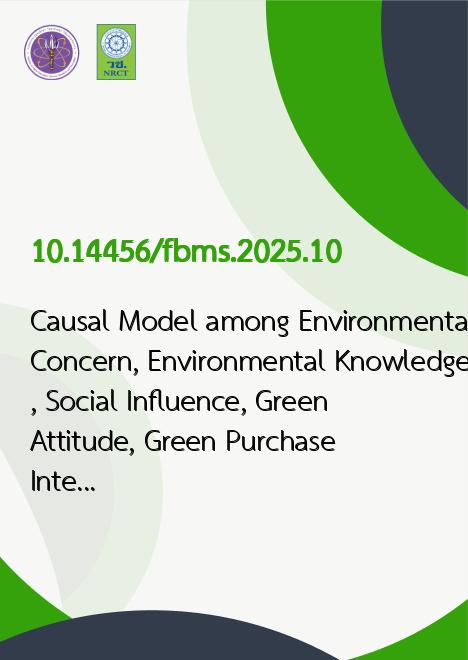
|
Causal Model among Environmental Concern, Environmental Knowledge, Social Influence, Green Attitude, Green Purchase Intention: Generation Z and Generation Y |
|---|---|
| รหัสดีโอไอ | |
| Creator | Phusit Wonglorsaichon |
| Title | Causal Model among Environmental Concern, Environmental Knowledge, Social Influence, Green Attitude, Green Purchase Intention: Generation Z and Generation Y |
| Publisher | University of the Thai Chamber of Commerce |
| Publication Year | 2568 |
| Journal Title | Journal of Family Business and Management Studies |
| Journal Vol. | 17 |
| Journal No. | 1 |
| Page no. | 191-212 |
| Keyword | Environmental Concern, Environmental Knowledge, Social Influence, Green Attitude, Green Purchase Intention |
| URL Website | www.fbmsjournal.com |
| Website title | fbmsjournal |
| ISSN | 2821-9643(online) |
| Abstract | This research aims to: (1) investigate the influence of environmental concern, environmental knowledge, and social influence on green attitudes towards green products in e-commerce; (2) examine the influence of green attitudes on green purchase intentions for green products in e-commerce; and (3) compare green purchase intentions for green products in e-commerce between Generation Z and Generation Y. The research utilized a quantitative approach. The sample comprised 1,071 e-commerce buyers from Generation Z and Generation Y in Thailand. Data were collected through an electronic questionnaire and analyzed using descriptive statistics, including frequency, percentage, mean, standard deviation, dependent t-test, and structural equation modeling (SEM) with LISREL software. The results indicated that the causal relationship model, incorporating environmental concern, environmental knowledge, social influence, green attitude, and green purchase intention for green products in e-commerce for Generation Z and Generation Y, was consistent with the empirical data. This was supported by a chi-square value with a p-value greater than 0.05, indicating that the null hypothesis could not be rejected and that the theoretical model fitted the data well. Additionally, (1) the predictor variables—environmental concern, environmental knowledge, and social influence—explained 81% of the variance in green attitude, with all predictors having a statistically significant positive impact on green attitude; and (2) green attitude, as a predictor, explained 99% of the variance in green purchase intention for green products in e-commerce. |
